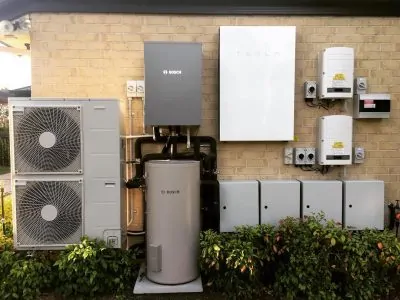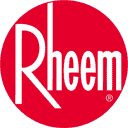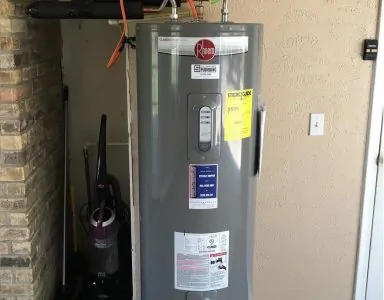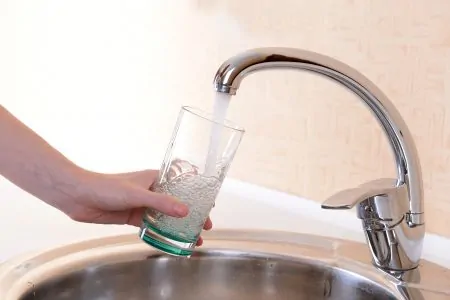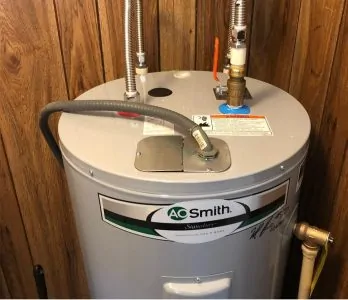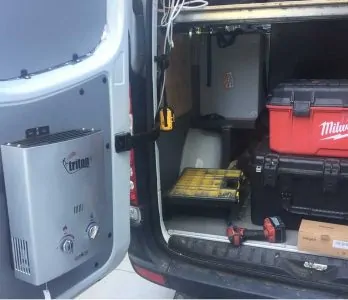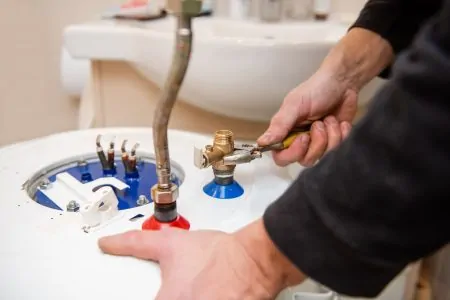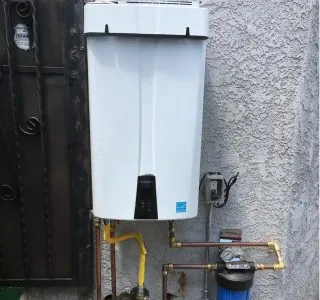A water heater is an essential part of any home, providing you with warmth and hot water. As important as they are, your water heater could be costing 20% of your home’s energy bills. That number could be even higher depending on the age of your unit.
Modern water heaters are more efficient and have energy-saving settings to help limit your energy expenditure. If it’s time to upgrade, it is easy to feel overwhelmed by the various heater types and the countless models that are now available.
To help you choose your ideal heater, we have put together our ultimate buying guide with nine of the best heaters you can buy. We conducted extensive research, looking at specifications and customer reviews, to provide our best heater reviews of each category.
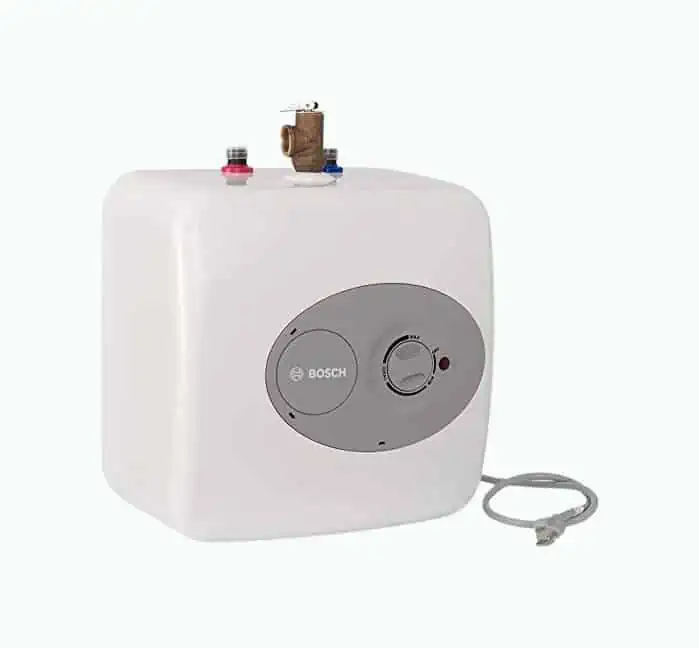
- Small and compact at just 13.75 inches
- 6.8-gallon per hour recovery rate
- Highly efficient CFC-free foam insulation
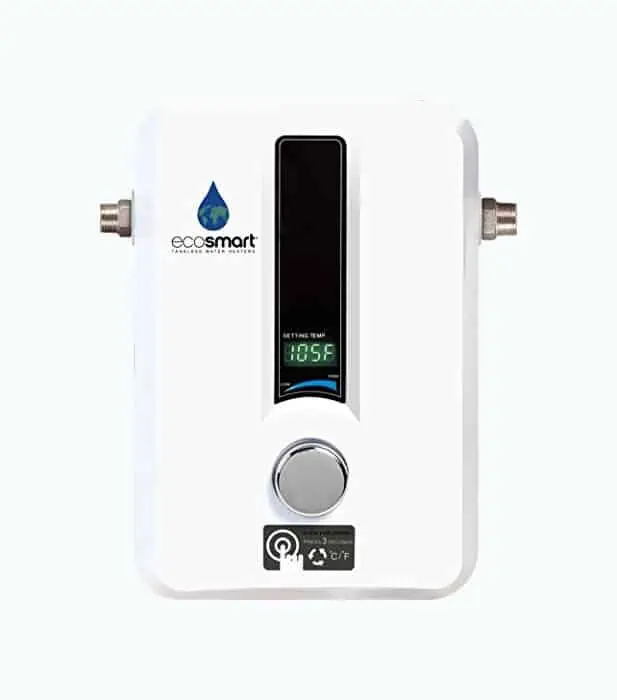
- Only 11.5 inches by 8 inches
- Fitted with self-modulating technology
- Digital display and dial thermostat
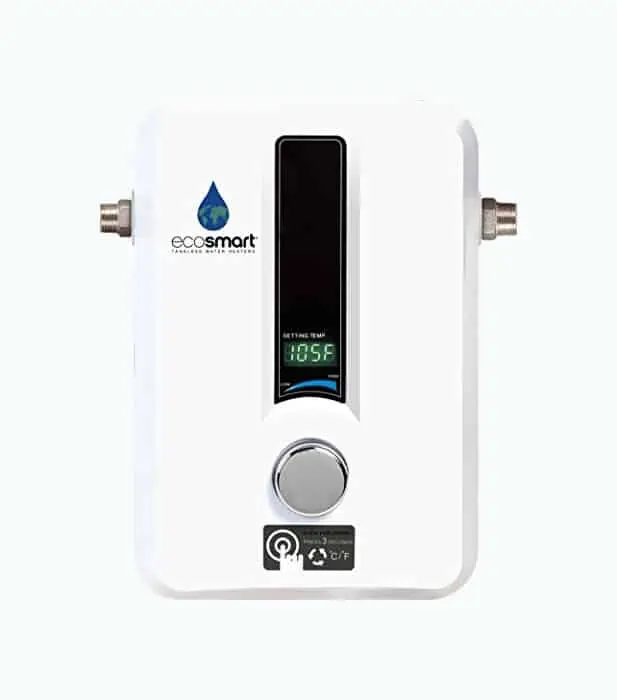
- Easy-to-read digital display and dial thermostat
- Just 11.5 by by 8 inches
- Ideal for limited use on a shower or sink
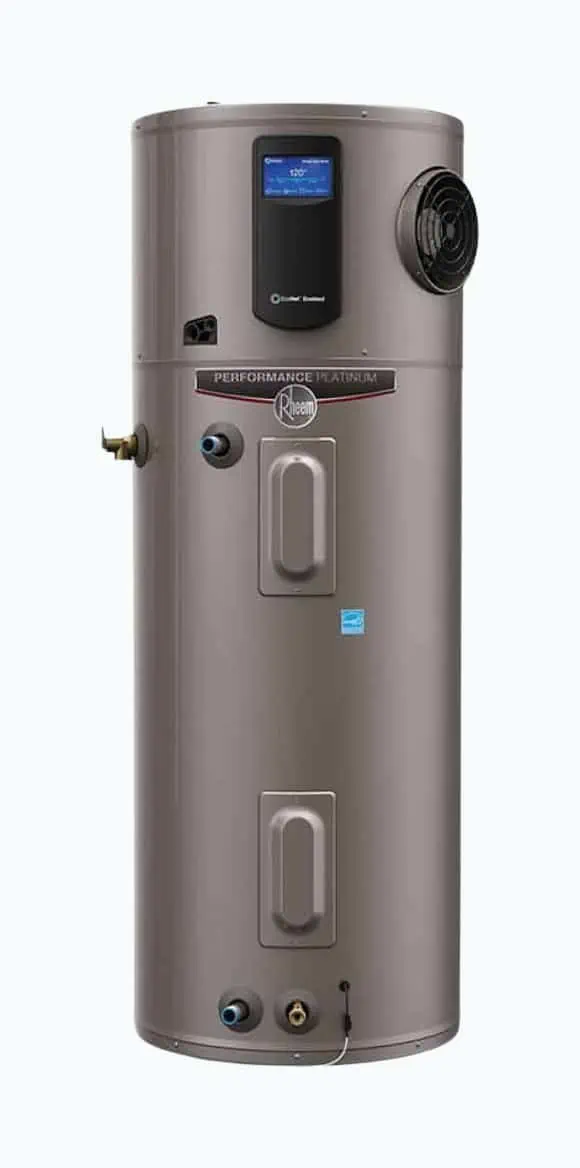
- Energy factor of 3.70
- Large 80-gallon tank
- Wi-Fi and smart home ready
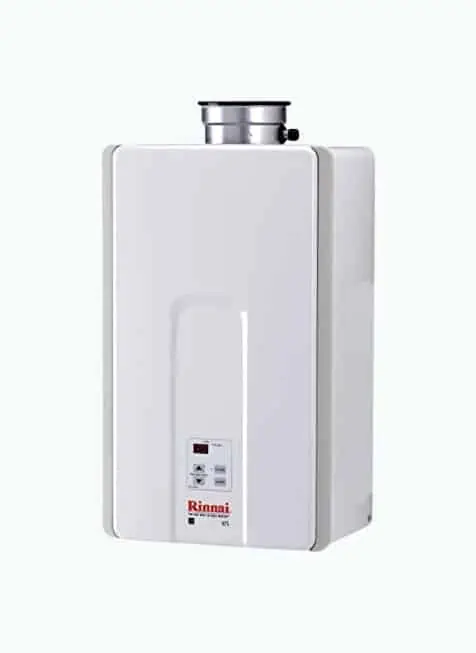
- Generates up to 199,000 BTU per hour
- Works well for 3 fixtures
- Wi-Fi capable
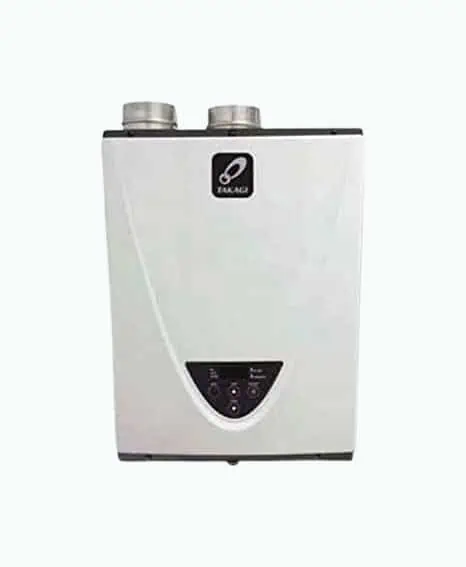
- Two durable heat exchangers
- Computerized safety features
- Integrated controls
No products found.
- Requires only 3.0 PSI to activate
- Includes shower head
- Portable handle
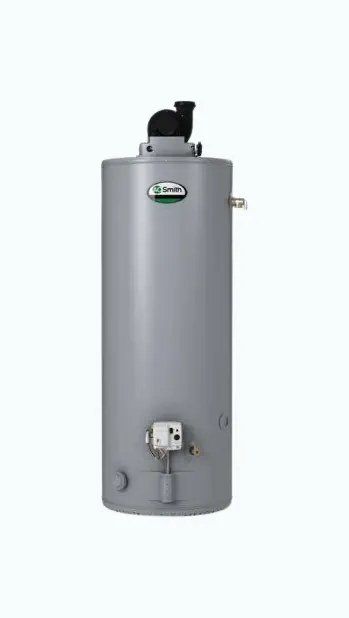
- 2-inch thick insulation foam
- Flexible blower outlet
- State-of-the-art electronic control
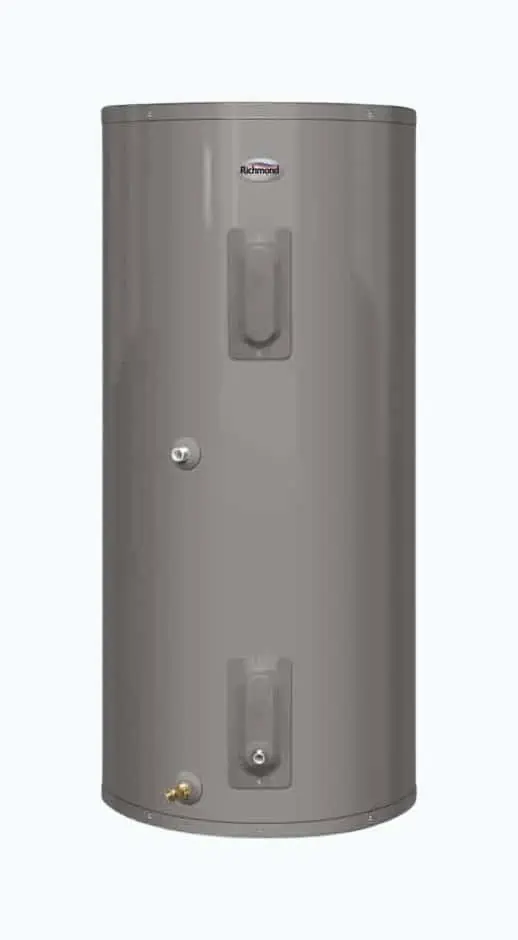
- Keeps hot and cold water separated
- Durable, glass-lined tank
- Multiple ports mean easy installation
Review Methodology: At Sensible Digs, we pride ourselves on delivering trustworthy, hands-on analysis and assessments of the best water heaters available in the market. Our experienced professionals conduct thorough research, comparing data, performance, and design choices to provide you with clear, objective evaluations. We measure and rank water heaters based on key decision-making factors such as energy efficiency, capacity, durability, and ease of installation. By sharing our findings and first-hand experiences, we help you understand what sets each product apart from its competitors and make informed choices backed by expert reviews and evidence. Trust Sensible Digs to guide you in selecting the ideal water heater to suit your needs.
The Best Water Heaters of 2024
Here are our picks for nine of the best water heaters currently available.
Bosch Electric Mini-Tank Water Heater
Best Under Sink Water Heater
The Tronic 3000 T is a mini-tank under sink water heater. This little heater is small and compact, able to fit in the cabinet under your bathroom sink.
It measures 13.75 inches by 13.75 inches and weighs 17.4 pounds. It includes a bracket for easy mounting.
Although this is a small, inconspicuous water heater, it’s made to last. The tank is glass-lined, minimizing the damage that hot water can cause.
The tank is also clad with CFC-free foam insulation, reducing standby heat loss and increasing its efficiency. No wonder the unit has a thermal efficiency of 98%.
It runs on electricity and requires a 120-volt outlet. With a fast recovery rate of 6.8 gallons per hour, it can supply two sinks simultaneously. Bosch has also included a pressure relief valve to keep the temperature steady.
Pros
- Small and compact, easy to fit and install with the included bracket.
- Durable tank lined with glass and non-CFC foam for insulation.
- Energy and thermally efficient.
- A fast recovery rate of 6.8 gallons per hour, plus a pressure relief valve.
Cons
- Some users mentioned that the thermostat is a bit slow to get the heater going.
Our Ratings
User Experience
EcoSmart ECO 11 Electric Tankless Water Heater
Best Electric Water Heater
For the best electric water heater, we have the EcoSmart Eco 11. This is a neat little tankless unit ideal for smaller homes. Depending on your local climate, you can use it as a point-of-use heater or for multiple applications.
EcoSmart claims that you can save up to 50% on your water heating costs by using their units. The ECO 11 has a flow rate of two gallons per minute. It also features a self-modulating technology enabling it to calculate the exact amount of energy it needs.
The unit is sleek and looks high-tech with a digital display and easy-to-use dial thermostat. The thermostat enables you to adjust the temperature in 1-degree increments.
What’s more, the Eco 11 is compact. It’s the second smallest unit from EcoSmart, measuring only 11.5 inches by 8 inches by 3.75 inches. It only weighs 6.5 pounds.
Pros
- The unit is energy and water-efficient.
- It’s fitted with a self-modulating technology.
- Sleek design with digital display and dial thermostat.
- Compact and lightweight — easy to install.
Cons
- Unit performance is heavily impacted by the inlet water temperature. Requires at least 67 degrees Fahrenheit for optimal performance.
Our Ratings
Personal Perspective
EcoSmart 8 KW Electric Tankless Water Heater
Best Tankless Water Heater
The Eco 8 is the smallest unit in the Eco line. Like its big brother, the Eco 8 is ideal for limited use. This could be used for your bathroom sink and shower, or perhaps your kitchen sink.
When the temperature is ideal, it delivers a flow rate of 0.3 gallons per minute. This rate means it can handle two applications simultaneously, for example, a sink and shower.
The unit is fitted with a sleek digital display and dial thermostat. You can choose a comfortable temperature between 80 degrees and 140 degrees Fahrenheit.
This water heater is not excluded from EcoSmart’s self-modulating technology. The boiler is small and compact, measuring 11.5 inches by 8 inches by 3.75 inches, and weighing 4.75 pounds.
Pros
- Features an easy-to-read digital display and dial thermostat.
- Saves water and energy.
- Compact and lightweight — a breeze to install.
Cons
- Not ideal in colder regions with an inlet water temperature of anything less than 67 degrees Fahrenheit.
Our Ratings
Community Feedback
Rheem Hybrid Smart Tank Water Heater
Best Hybrid Water Heater
Rheem has provided customers with one of the smartest, most efficient, and quietest hybrids on today’s market.
The company claims its hybrid heat pump design is a staggering four times more efficient than a regular electric unit. It has an estimated energy factor of 3.70. Rheem even suggests that you could save thousands on your annual energy costs.
Savings aside, this hybrid features an 80-gallon holding tank, ideal for homes with three to five bathrooms.
It stands out with its smart technology. The unit comes with built-in Wi-Fi. By downloading the EcoNet app, you can control your hybrid from anywhere.
The system will send alerts directly to your phone. These include maintenance information, major component failure notifications, service, and high pressure and temperature alerts. It even has a water leak detection system that will notify you if a leak occurs.
The tank is fitted with stainless steel elements to prevent rust and corrosion. Finally, the unit is whisper quiet.
Pros
- Highly energy efficient with an energy factor of 3.70.
- Sufficient for a large family with three to five bathrooms.
- Wi-Fi and smart home ready — sends you updates and alerts via the EcoNet app.
- Whisper quiet operating noise.
Cons
- Some complained that the unit was difficult to install — especially as a replacement. It apparently requires lots of changes to existing pipes.
Our Ratings
First-Hand Impression
Rinnai V75IN 7.5 GPM Indoor Tankless Gas Water Heater
Best Gas Water Heater
Rinnai is a leading brand when it comes to tankless gas water heaters. The V75iN is from their “V” series. It’s powered by natural gas and features non-condensing technology, giving it an efficiency of 0.82.
Rinnai’s V series is considered its “economy” line, great for the budget-minded family. However, they are still powerful, generating a maximum of 199,000 BTU an hour.
The boiler is capable of delivering an indefinite flow of hot water for up to three fixtures. You can adjust the temperature between 98 degrees and 140 degrees Fahrenheit with the digital controller. It will also display error codes if any issues occur.
The unit is Wi-Fi compatible but requires you to purchase a separate Wi-Fi module. This model is also very easy to install. It has a decent size of 23 inches by 14 inches, and a weight of 49.6 pounds.
Pros
- Highly energy efficient.
- Works excellently for three fixtures.
- A good, compact size considering its power.
- Wi-Fi capable.
Cons
- If you want the Wi-Fi option, you will need to purchase a separate module.
- Some users reported that it takes more than a minute to deliver hot water.
Our Ratings
User Experience
Takagi T-H3-DV-N Condensing Tankless Water Heater
Best Condensing Water Heater
This heater from Takagi is a perfect example of a condensing boiler. It’s Energy Star qualified and complies with the Ultra Low NOx emission regulations.
The heater is fitted with two heat exchangers. Its primary exchanger is a commercial-grade copper alloy. Takagi claims this to be 25 times more effective at transferring heat.
The second heat exchanger is made from stainless steel, so it will resist rust and corrosion.
This water heater can produce up to 199,000 BTU an hour and has a uniform energy factor of 0.93. Its performance is unfortunately affected by the climate. Even so, in cooler regions, it can still deliver enough water for three running showers.
It comes with integrated controls and computerized safety features. These include overheat, freeze and surge protection.
Pros
- Features two durable heat exchangers.
- Can produce enough hot water for four running showers.
- Includes integrated controls.
- Fitted with computerized safety features.
Cons
- A few reviewers reported that it makes a significant noise while working.
Our Ratings
Personal Perspective
Camplux 5L Portable Propane Tankless Water Heater
Best Portable Water Heater
This unit is ideal for the summer, encouraging outdoor living. All you need is propane and a water source providing a pressure of 3.0 PSI.
A unique feature of this unit is that it’s like a portable shower. Along with the heater, you will receive a shower hose and head.
You can choose a temperature between 46.4 degrees and 114.8 degrees Fahrenheit. The heater is compact and comes with an attached folding handle, making it very convenient to set up. It measures 14.8 inches by 11.42 inches and weighs 14.2 pounds.
Despite being portable, it has a decent flow rate of 1.32 gallons per minute. It also features energy-saving technology, a flame failure device, freeze protection, and oxygen depletion safety.
Pros
- It requires pressure of just 3.0 PSI to activate.
- It provides a portable shower solution with its included shower head.
- Compact and relatively lightweight with a portable handle.
- Includes some important features for safety and energy saving.
Cons
- The shower hose is made from cheap plastic and doesn’t last long.
Our Ratings
Community Feedback
A.O. Smith GPVL-50 ProMax Gas Water Heater
Best 50-Gallon Water Heater
This A.O. Smith 50-gallon gas water heater is great for an average family of four to five people. It’s highly efficient, fitted with a state-of-the-art electronic gas control.
It features a hot-surface igniter that minimizes fuel usage. Its 2-inch thick and eco-friendly foam insulation helps reduce heat loss and uses minimal energy with greater efficiency.
The unit boasts accurate water temperature control with the help of its state-of-the-art electronic gas control.
It has a fitted two-pipe combustion control system that solves indoor ventilation problems.
Pros
- Durable and stylish.
- Flexible blower outlet.
- Energy-efficient.
Cons
- Heavy at 213 pounds.
Our Ratings
First-Hand Impression
Solar Richmond 6-Year 4500-Watt Universal Connect
Best Solar Water Heater
This Richmond Solar unit is excellent for the eco-minded, budget-oriented homeowner. It has an 80-gallon storage tank, designed for a single or double collector closed-loop glycol system.
It features technology that forces the cold inlet water to the bottom of the tank. This prevents it from mixing with the already heated water, increasing its overall efficiency.
This unit will comfortably provide enough hot water for up to five people. It also has a built-in electric heater for backup support, should it be needed. This consists of multi-port connections for extra power during cloudy days. Even when the sun is a no-show, you will still have hot water.
The tank features a glass lining, so it’s resistant to rust and corrosion. Just in case, Richmond still includes a six-year tank warranty.
All the ports and fittings are located in convenient spots for easy installation. You can find these ports on top and on both sides.
Pros
- Highly efficient.
- Backed up by a standard electric water heater for cloudy days.
- Durable, glass-lined tank.
- Easy to install.
Cons
- Although it’s prewired for a resistor, the resistor isn’t included.
Our Ratings
User Experience
Types of Water Heaters
Before looking at our top-rated heaters, we will quickly explain the different types of heaters. When buying a new water heater, you shouldn’t limit your options to a tank or tankless and gas or electric. There are many other types of water heaters, such as hybrid and condensing units. These are among the best energy savers.
Tankless Water Heater
Tankless water heaters can run on gas or electricity. Also known as “on-demand” water heaters, they heat water when it’s needed, rather than having a storage tank. When you turn on your hot water tap, the unit will activate, heating the water as it flows through the unit.
Switching from a regular storage tank to a tankless can be difficult and expensive as it requires a different system. On the other hand, if you’re building a new home, it’s easy and sensible to install a tankless unit.
Pros
- On-demand: It will only heat the water you need, meaning much less wasted water.
- Compact size: A tankless unit is much smaller than the average 50-gallon tank. It can also be mounted to a wall.
- Less waiting time: You will receive hot water much quicker than with a standard tank water heater.
Cons
- Not good for simultaneous use: Tankless units can struggle to keep up with simultaneous use.
Storage Tank Water Heaters
Storage tank water heaters are the most common type. They are powered by electricity, gas, or propane.
Tanks come in various sizes, with the most popular including 40, 50, and 80 gallons. For the average family of four, a 50-gallon tank will be sufficient.
Pros
- Affordable initial price: The initial cost of a tank water heater is usually less than other types.
- Easy installation: Tank water heaters are fairly straightforward to install if you have a gas line or electrical outlet.
- Proven system: Tank water heaters have been around for more than a century. They use a tried and tested system that you know will work, and they are among the most reliable heaters.
Cons
- Standby heat loss: The water tends to lose significant heat through the tank. This can be limited with extra insulation.
- Potential leaks: With so much water stored in the tank, a leak could cause serious water damage.
- Insufficient supply: As the tank is emptied during heavy use, there is a possibility of running out of hot water.
Hybrid Water Heaters
Hybrid water heaters, also referred to as hybrid heat pump water heaters are some of the most energy-efficient units available.
They function using the opposite logic to a fridge, drawing heat from their surroundings. It then transfers this heat to a gas that circles the water in a tank to heat it (1).
It is a hybrid due to the extra electrical element. This switches on whenever hot water is in high demand or when its supply is low.
Pros
- Economical electricity usage: Hybrids use a small amount of electricity compared to tank heaters.
- Multiple settings: Hybrid models generally offer four to five settings to accommodate your needs.
- Kinder to the environment: It uses minimal electricity and doesn’t emit any greenhouse gases.
Cons
- Long recovery time: Hybrid models can take a very long time to heat a full tank of water.
- Requires a specific climate and space: Hybrid units require a temperature of 40 to 90 degrees Fahrenheit. They also need a space of 1,000 cubic feet (2).
Solar Water Heaters
A solar water heater heats your water using the energy it collects from the sun. There are two main types of solar-powered water heaters: active and passive. Active systems include a circulation pump and controls, while passive systems don’t.
Pros
- Eco-friendly: Solar units don’t use electricity or gas. They are energy-saving and doesn’t emit any greenhouse gases.
- No energy costs: You will be collecting your own energy from the sun, so there will be no extra costs.
- Hot water all year: The most common collector type, an evacuated tube collector, can work even in overcast conditions.
Cons
- Won’t work in all climates: Solar power requires sunlight. In colder and darker climates it may not work as well.
Condensing Water Heaters
A condensing water heater extracts the heat from the leftover exhaust gas, cooling it down. It uses this energy to further heat the water within the tank. The now cold, leftover exhaust gas is then emitted from the system.
These types of water heaters create a lot of condensation, which is acidic. The condensation also collects inside the unit. This means they need to be made from a durable material that can withstand corrosion.
Condensing water heaters are available as a tank or tankless unit (3).
Pros
- Easier on the environment: As the exhaust gases are cooler, they aren’t as bad for the environment.
- Don’t need expensive piping: Regular gas water heaters require a specialized PVC pipe for the exhaust due to high temperatures.
- Lower bills: Condensing water heaters use less gas while heating, helping you save on your natural gas bills.
Cons
- Condensation water is acidic: The water is slightly acidic, and enough to cause corrosive damage.
The Best Water Heater Brands
There is a large number of water heater manufacturers active today, some of whom are very well-known. You don’t necessarily have to choose the biggest brand to get the best unit; it all depends on your individual needs. Here are some of the biggest and best water heater brands operating today.
Tips for Buying a Water Heater
When buying a new water heater, you need a unit that will be suitable for your demands, whether they are small or large. Here are a few things worth considering:
1. Size
With a unit that is too small, you will end up running out of water. If it’s too big, you could waste money and energy.
If you choose a tankless heater, it’s important to consider the flow rate. This measures how much water the unit can provide you with at once. In a large home, for example, one tankless unit probably won’t be sufficient.
2. Warranty
Malfunctions can affect even the best water heater. If one occurs, you want to be sure it won’t cost you. Choosing a water heater with a good warranty will give you peace of mind. The best warranties usually come from companies with the largest market share.
3. Digital Displays
Having a unit with a digital display can make it simpler to read and adjust. You will be able to determine your preferred temperatures and easily turn the heater on and off. It will also help you to monitor the energy used.
4. Where to Buy
Many homeowners think the best way to buy a new water heater is through your local plumber. However, that isn’t always the case. We have found that buying through online retailers such as Amazon and Home Depot is best.
You can also access these heaters via the product’s official website. If you use this route, you can find great deals and the best warranties.
